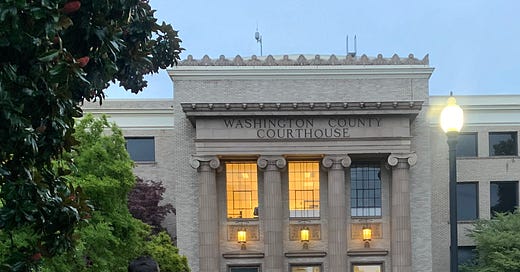The constitutional duty to provide public defenders
Meeting the need will require hiring attorneys as state employees and training young defense advocates, the sooner the better
Ensuring the constitutional right to an attorney for indigent prisoners in Oregon has proven elusive. The solution is straightforward but not easy – we need more public defenders.
The path to more public defenders is a combination of paying defense attorneys more and hiring more defense attorneys as state employees. The Legislature appears on a path to do just that in Senate Bill 337.
Being stingy with public defender pay has led to fewer defense attorneys willing to represent incarcerated indigent people. The result has been some defendants sit in jail for extended periods. In some circumstances, local prosecutors have dropped charges or sought release for prisoners before they have been arraigned. That’s not good justice for anyone.
There is a stigma attached to indigent defendants, and some public resentment for footing the bill for their legal defense. The right to legal counsel is guaranteed under the Sixth Amendment of the Constitution, so stigmas and resentments don’t matter.
Public defenders are either court-appointed, part of an assigned counsel system or hired under contract. When there isn’t enough money, those pools dry up. The obvious remaining option is what SB 337 proposes – hire public defenders as state employees, so their day job is representing indigent clients.
This solution, however, doesn’t necessarily mesh with available legal talent that wants a state job representing indigent clients. SB 337 phases in hiring public defenders as state employees to 20 percent by 2031 and 30 percent by 2035. This timeline implies working with law schools and advocacy groups to develop a pool of lawyers interested in these jobs.
After a round of applause, the problem with too few public defenders will remain with us for more than a decade – assuming the state can the find enough money and enough attorneys to hire as public defenders. Legislators’ interim plan is Senate Bill 1093, which would require each Oregon judicial district to develop an unrepresented defendant crisis plan. Judges in larger jurisdictions would be required to appoint a crisis team to oversee the plan.
The better plan is to bite the bullet, put money on the table now to hire public defenders and work like hell to find motivated lawyers and willing law students to represent these clients. There are lots of pressing problems that require state investment, and for many people spending on public defenders isn’t one of them. Landing in court is a lot like landing on the street. They are often part of the same problem.
History of Public Defender Movement
The public defender movement is relatively recent, following the U.S. Supreme Court ruling in Gideon v. Wainwright 45 years ago that said, “In our adversary system of criminal justice, any person hauled into court, who is too poor to hire a lawyer, cannot be assured a fair trial unless counsel is provided for him.” The court further observed that “lawyers in criminal courts are necessities, not luxuries” and that the government has a constitutional obligation to provide lawyers for people charged with felonies who cannot afford to hire their own.”
In 2009, a national study was conducted that found “the state of defense services for the poor is sorely wanting, with grave problems nationwide.” It may be worse now. One of biggest problems: public defender budgets are easy targets to cut by Democrats as well as Republicans.
A byproduct of inadequate public defense has been wrongly convicted defendants. Reversing those convictions winds up costing more money and time in courts than biting the bullet and hiring public defenders in the first place.
It takes a lot of hard work to get into and pay for law school, so there is a built-in disincentive to focus on indigent legal defense. Representing indigents charged with illicit drug possession or sexual violence isn’t as appealing as working in corporate law, family law or as a prosecutor. Those jobs have upward potential for prestige, pay and public office.
Not a Throw-In Safeguard
The Sixth Amendment wasn’t just a throw-in to the Bill of Rights. Its provisions trace to English common law that viewed trial by jury, the assistance of counsel and the right to a speedy trial as essential rights to guarantee liberty for all. Despite that legacy, the “assistance of counsel” for indigent prisoners has been shuffled to the back of the deck with excuses like, “They have no one to blame but themselves” and “They get what they pay for”.
Liberty isn’t safeguarded by excuses. Liberty is defended, including the defense of the poor and the indigent. Like everyone else, they are innocent until proven guilty. They should have a credible chance to prove their innocence. That will require many more public defenders, and the sooner the better.
Our liberties are more vulnerable than we imagine. Privacy is invaded. Legislation intrudes on personal decision-making. Disinformation obscures the truth. When any part of the fabric of liberty is tattered, the protection it provides all of us becomes more vulnerable. Every liberty, including defending prisoners who are poor, is a defense against tyrants. That’s why the Sixth Amendment exists.





